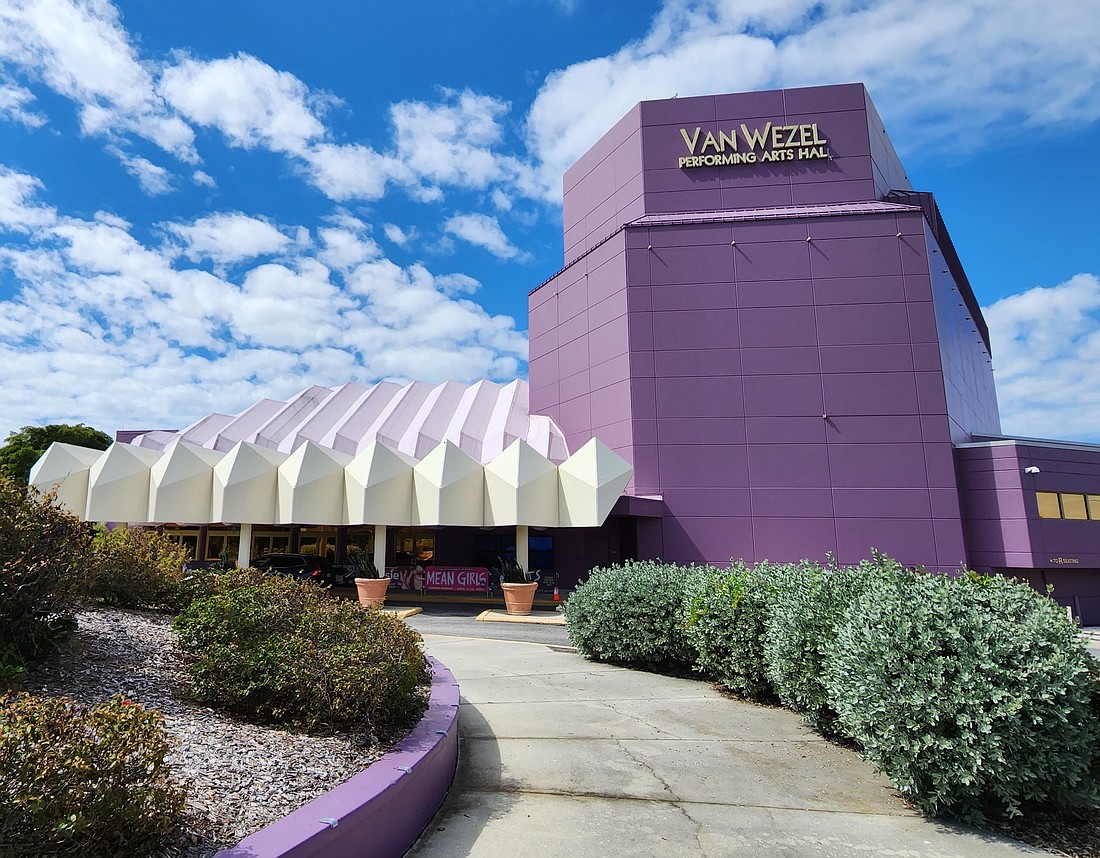- April 4, 2025
-
-
Loading

When the Sarasota City Commission gets around to seating a committee to explore the reuse potential of the Van Wezel Performing Arts Hall, it will consist of seven members — five of them with demonstrated expertise in specific relevant disciplines and two citizens at-large.
That was the decision made on March 6 by commissioners, who also officially changed the name of the panel from Blue Ribbon to Purple Ribbon, paying homage to the color scheme of the building.
The panel will be tasked with exploring feasibility and functionality of refurbishing the building, and re-tasking it in a manner that would not operate in competition with the planned Sarasota Performing Arts Center planned for the opposite corner of the parking lot.
At the onset of the discussion, two citizens raised the question of whether the committee’s task should be so narrowly focused, challenging that the city doesn’t need both the Van Wezel and the SPAC to meet its cultural ambitions.
The committee is required as part of a forthcoming implementation agreement with the SPAC Foundation, which the commission will see at its March 20 meeting.
“Today you're discussing a process for appointing a committee to determine future uses of the Van Wezel,” said resident Jose Fernandez. “Even commissioners, not to mention citizens, are not clear as to whether a decision to build a new SPAC had been made and therefore what the actual purpose of this committee is.
“We have already started implementation of the agreement and spending money with the architects' selection committees, benchmarking visits to other venues, workshops, etc., all the while some of you are still not clear on what you've agreed to,” he continued. “There are people on both sides of this issue — build new or refurbish the old. (The decision to build) the new SPAC has been made as evidenced by the work that's been done and the money that's been spent.”
To his point, establishing the process of selecting the reuse-oriented committee was the subject of the commission’s discussion, and the timing lends itself to concurrency with the eventual signing of the implementation agreement with the Van Wezel Foundation and advancing toward funding, design and construction plans.
Among the most vocal opponents of the SPAC, city resident Kelly Franklin reiterated her position that the Van Wezel should be refurbished and continue to serve as the city’s primary performing arts hall.
“(The SPAC) proposal is based on two assumptions, which have proven to be fundamentally flawed,” she said. “The first is that we need more seats. The fact is the Van Wezel has only reached capacity 11% of the time over the last 10 years. We don't need more seats, and even if we had them, Tampa will still enforce 90-mile blackouts on the newest Broadway tours. The second false assumption is that the Van Wezel is in bad shape and can't be protected from the elements.”
Franklin added that the first question the task force should address is the cost to “protect, polish and keep the iconic Van Wezel Performing Arts Hall.”
Objections notwithstanding, the discussion proceeded with the commission ultimately settling on selecting five professionals with expertise — they sidestepped the word “experts” as a subjective term — in five areas. They are:
In addition, two citizens will be appointed to the committee. All candidates must submit applications and the panel will be selected by majority vote of the commission.
Ideally, candidates will have no demonstrative bias toward replacing the Van Wezel. Vice Mayor Liz Alpert suggested the commission not restrict itself to considering local candidates only. She agreed with Commissioner Jen Ahearn-Koch that, providing equal qualifications, selections should favor local candidates.
“If there is somebody better qualified, I don't want to take the Sarasota County one over somebody who's more qualified from somewhere else,” Alpert said. “ I want to make sure we have the expertise, and they all might be here.”
As a practical matter, Commissioner Debbie Trice offered, most applicants, if not all, will be local anyway.
“I am assuming that people who serve on this committee will be doing it without remuneration,” she said, “so it's probably unlikely that someone from Idaho is going to apply. It’s possible, but unlikely.”
City Manager Marlon Brown suggested a time frame of 12 to 18 months for the committee to research and prepare a report with the help of a facilitator who can help guide its discussions.
Staff will draft a resolution for commissioners to consider any a future meeting, after which candidates can submit applications.
Concurrent with the Purple Ribbon Committee discussions, a SPAC Foundation task force continues its work to whittle down to three the architecture firm finalists for the task of designing the new building. From an original field of 43 that responded to a request for qualifications, the task force first narrowed the list to 18 before a second round of cuts left six remaining.